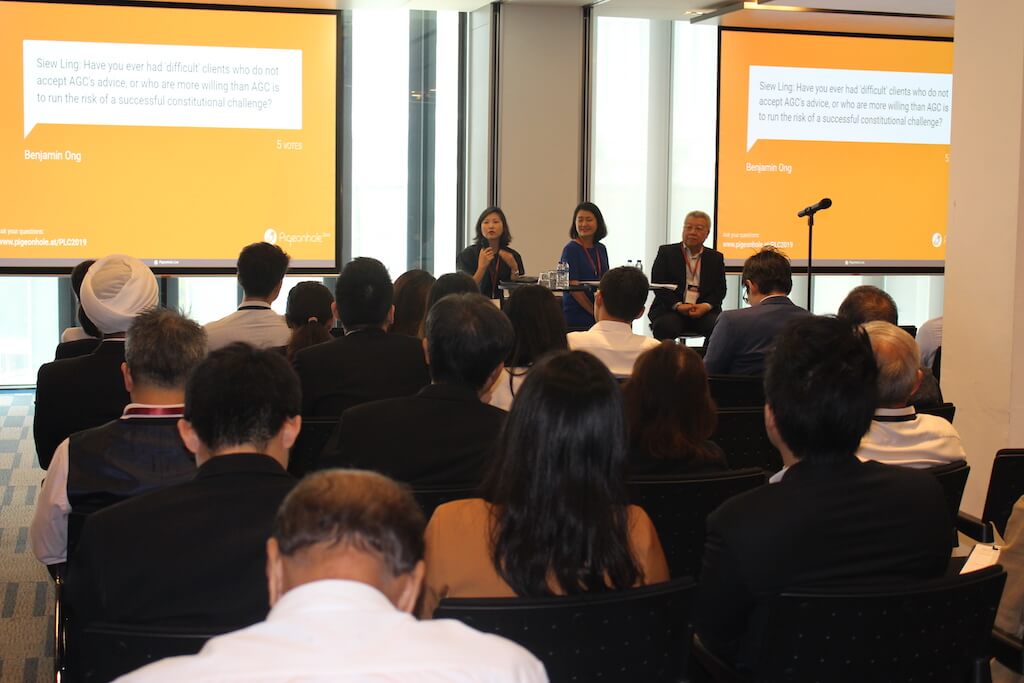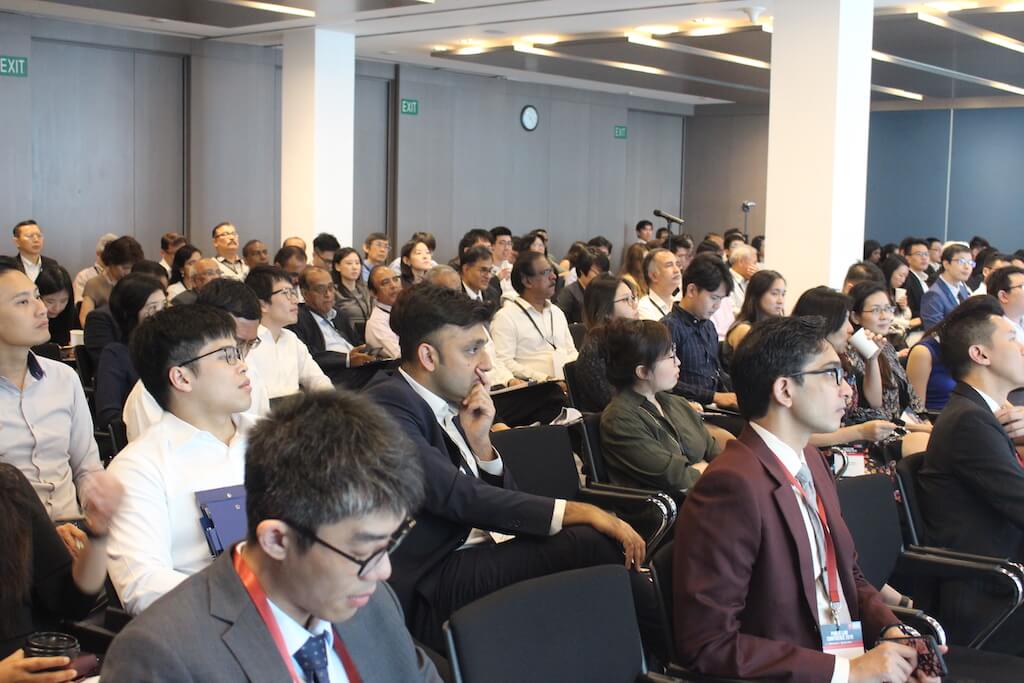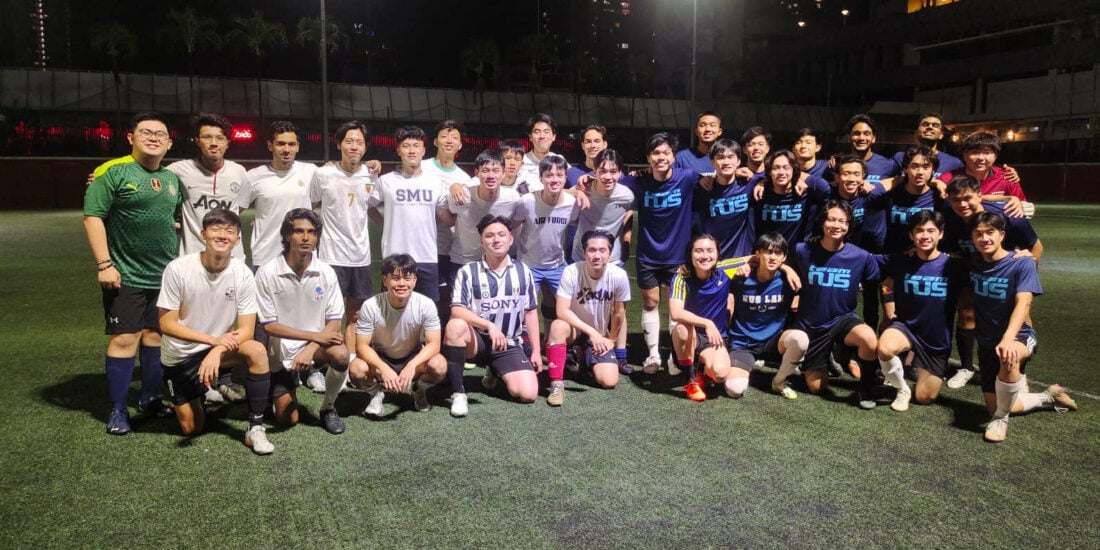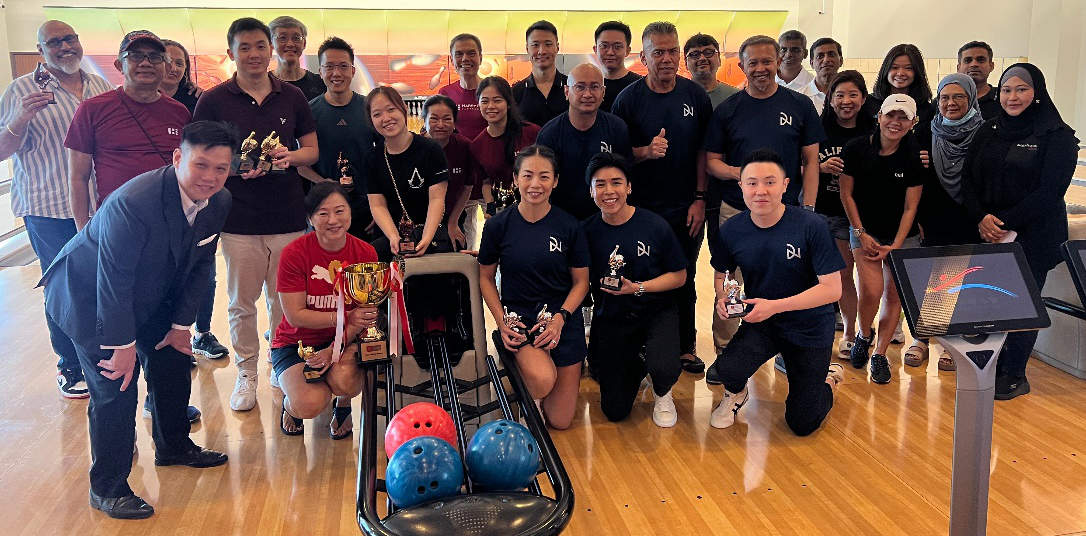
Public Law Conference 2019
The Law Society of Singapore’s Public Law Conference was held on 8 October 2019, drawing a good turnout of more than 130 participants who came to hear the latest updates and thought leadership on issues of public law.
The day started with welcome remarks from Mr Prakash Pillai (Chairperson of the Public and International Law Committee (PILC)) and a discussion by him of the recent UK Supreme Court case of R v The Prime Minister & others {2019} UKSC 41 where the UK Supreme Court declared invalid the UK Prime Minister’s recent attempt to prorogue the British parliament. Mr Pillai observed that these were exciting times for public lawyers, making the work of the PILC very topical and relevant, which would bode well for the development of this branch of the law. The welcome remarks were followed by a thought-provoking keynote address by the President of the Law Society, Mr Gregory Vijayendran SC, who confronted the audience with the concept of “parrhesia”. In Ancient Greece, “parrhesia” meant more than just freedom of speech: it entailed speaking boldly or freely for the common good, even at personal risk.
Article 14(2) of Singapore’s Constitution contains restrictions to the general right of freedom of speech and expression, which Mr Vijayendran suggested, not unlike the concept of “parrhesia” may all be rationalised by the principle of preventing harm to others. Article 14(2) grants Parliament a broad discretion to decide on restrictions to freedom of speech, and the exercise of this discretion is non-justiciable. The Courts’ role is limited to examining the nexus between the objective of a given law and allowable restrictions to freedom of speech. We see such restrictions in Singapore’s laws criminalising actions against racial and religious harmony, as well as the Protection from Online Falsehoods and Manipulation Act 2019. The latter raises questions of whether the distinction between fact and opinion is sufficiently clear, as well as the concern that the Act could be misused for political reasons.
Mr Vijayendran concluded with a reference to the High Court’s words in Chee Siok Chin and others v Minister for Home Affairs and another [2006] 1 SLR(R) 582 that free speech must be exercised responsibly and within the confines of the law. In line with this, Mr Vijayendran submitted that the freedom of speech comes with the corresponding freedom not to speak.

Speakers for Plenary Session 1
From L to R: Low Siew Ling – Senior State Counsel (Civil Division), AGC, Dr Jaclyn Neo – Associate Professor (Faculty of Law), NUS; Consultant, WongPartnership LLP and Dr Kevin Tan – Adjunct Professor (Faculty of Law), NUS
The conference continued with Plenary Session 1, “Constitutional Interpretation: Analysing Recent Approaches“. Senior State Counsel Ms Low Siew Ling (Attorney-General Chambers) spoke on the role of AGC as chief legal advisor to the government and its approach to constitutional issues. Using Tan Cheng Bock v Attorney-General [2017] 2 SLR 850 as an example, Ms Low discussed the Court’s approach in interpreting the legislative purpose of Articles 19B and 164 of the Constitution of Singapore, through a review of extraneous materials and a determination of the most likely interpretation of a given provision. Ms Low also spoke on ancillary issues that arise in advising the Government on constitutional issues, such as the inevitable implications of unwinding an existing policy and a consideration of the public interest.
Dr Jaclyn Neo (National University of Singapore) discussed the purposive approach taken in Wong Souk Yee v Attorney-General [2019] 1 SLR 1223 on the interpretation of Article 49 of the Singapore Constitution. In her analysis of the Court’s approach, Dr Neo also raised key issues that ought to be considered, namely, (i) the problems with the purposive approach, and (ii) that the rules of construction applied to statutes should not be imported into an interpretation of the Constitution, since the Constitution is not an ordinary piece of legislation.
Turning to the topic of the constitutionality of section 377A of the Penal Code vis-à-vis Article 12 of the Constitution, Dr Kevin Tan (National University of Singapore) presented on the Court’s approach in Lim Meng Suang and another v Attorney-General and another appeal and another matter [2015] 1 SLR 26. Dr Tan put forward some arguments for the actual conduct section 377A criminalised (and was intended to criminalise), having regard to its legislative history compared to section 377 of the Penal Code and section 23 of the Minor Offences Act as it then was. Dr Tan also put forward a proposition for an additional limb to the “reasonable classification test”, namely: “Is the discrimination necessary or logical for the purposes of the Act?” These raised interesting questions in the following panel discussion on how the Court should decide what is “necessary and logical”, and whether the Courts do or should look at questions of morality.
Plenary Session 2, “Freedom of Speech – Contextualized or Circumscribed” began with an animated and engaging discussion with Professor David Tan (National University of Singapore) on the balance to be struck in relation to the freedom of speech. This constitutional right applies only to citizens in Singapore, and Parliament also has a broad discretion as to when and how it may circumscribe this freedom. The Courts have also observed that the circumstances in Singapore are unique and therefore the balance in relation to the freedom of speech cannot simply follow that in other countries.
Mr Remy Choo (Peter Low & Choo LLC) also shared thoughts on the arguments that could be run if a party were to bring a challenge under Article 14(2). He opined that a direct challenge to a law for being in breach of Article 14(2) is likely to be extremely difficult, but arguing either that executive action or the executive’s interpretation of legislation is unconstitutional are other available avenues. Amongst other things, a creative plaintiff could seek to relook the issue of whether proportionality analysis applies in Singapore or whether certain legislation should benefit from a presumption of constitutionality.
In Plenary Session 3, “Hot Button Public Law Issues in Singapore”, the speakers examined the “green light” approach to judicial review by the Courts. In particular, they discussed the attitudes of the Singapore Courts towards public law ideologies of proportionality review, the doctrine of substantive legitimate expectation, and the “basic structure” doctrine, all of which involve a higher degree of judicial scrutiny on grounds of merits (as opposed to legality).
Ms Aurill Kam (Legal Clinic LLC) presented on the position of the doctrine of substantive legitimate expectation in Singapore law. Analysing the line of case law from Borissik Svetlana v Urban Redevelopment Authority [2009] 4 SLR(R) 92 to SGB Starkstrom Pte Ltd v Commissioner for Labour [2016] 3 SLR 598, Ms Kam noted that the applicability of the doctrine has never been authoritatively decided by the Singapore Courts, with only fleeting references made. Ms Kam opined that the recognition of substantive legitimate expectation would promote trust and confidence between citizens and the public administration.
Dr Jack Lee (Singapore Academy of Law) spoke on the “basic structure” doctrine. His main criticism of the doctrine is that it is not explicitly contemplated by the Singapore Constitution and may unduly expand judicial power. Examining the approach of the Courts from early cases to more recent cases such as Yong Vui Kong v Public Prosecutor [2015] 2 SLR 1129 and Wong Souk Yee v Attorney-General [2019] 1 SLR 1223, Dr Lee concluded that while the High Court in earlier cases had explicitly held that the basic structure doctrine did not apply in Singapore, later cases before the Court of Appeal have referred to the doctrine but have not ruled on the issue.
To end, Mr Benjamin Ong (Singapore Management University) examined the concept of proportionality and its application in Singapore. Notwithstanding that the Courts have seemingly rejected the proportionality test in recent case law, Mr Ong opined that that the Courts do know how to implement the proportionality analysis in their review of the executive powers. Citing Vijaya Kumar s/o Rajendran and others v Attorney-General [2015] SGHC 244 as an example, Mr Ong suggested that the Court’s reasoning (i.e. that the police had shown there were legitimate concerns about public order and that certain measures were directed at preserving public order) in coming to its decision that there was no unfair discrimination nor irrationality in the measures taken by the police, was effectively a proportionality test.
Dr Michael Hwang SC (Vice-Chairperson of the PILC) rounded off the day’s sessions observing how the amount of content in this area of law has increased dramatically and has moved in various unexpected directions. Public law issues are relevant to matters of daily concern. Hence, he called on lawyers to stay informed and updated on such issues, not just for professional development, but in order to participate in the vital national conversation on issues of public law.

Group photo consisting of some of the Conference speakers and members of the Public and International Law Committee 2019

Participants at the Public Law Conference 2019






